Our Networks
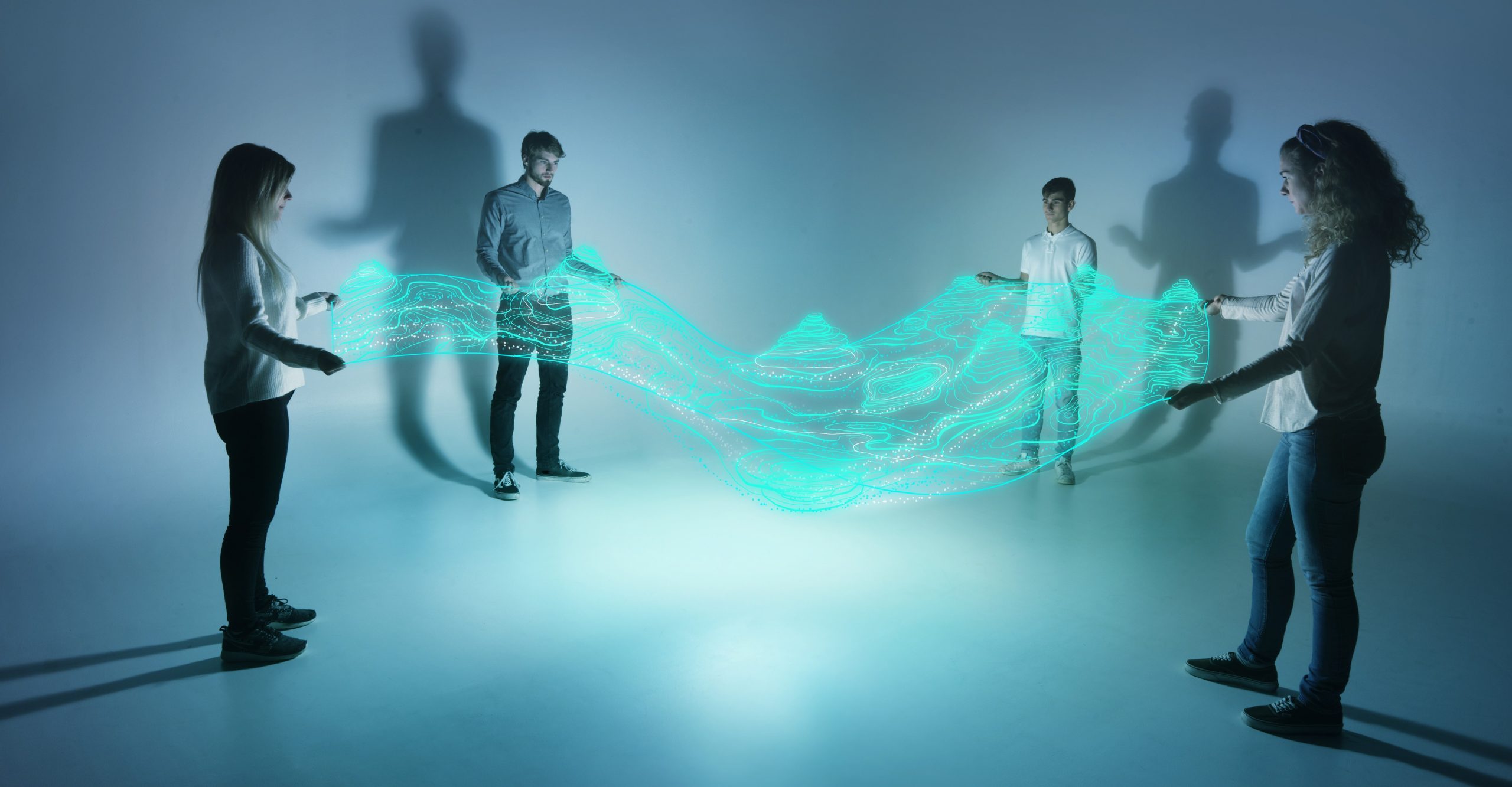
Sharing and expanding knowledge with our research networks helps to ensure the best possible outcomes for the discipline of Robotic Vision.
Publications and Presentations
Our researchers published a total of 205 papers, including 107 conference papers and 98 journal articles. See the 2019 Publications page for a full list.
Key publications included:
- PhD Researcher Anh-Dzung Doan and University of Adelaide researchers won the APRS/IAPR Best Paper Award at the Digital Image Computing: Techniques & Applications (DICTA) conference held in Perth for their paper “Visual Localization Under Appearance Change: A Filtering Approach.”
- Research Affiliate and former Centre Research Fellow Dr Valerio Ortenzi was lead author for the article “Robotic manipulation and the role of the task in the metric of success” published in Nature’s Machine Intelligence. The research was conducted in collaboration with Centre
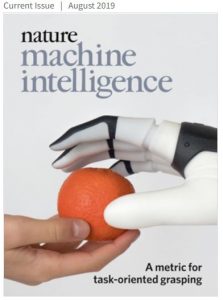 researchers at QUT, the University of Birmingham, Scuola Superiore Sant’Anna, Italy, the German Aerospace Center (DLR), Germany, and the University of Pisa, Italy. The paper was featured as the cover article of the August 2019 edition, and it explored the issue of robots using objects. Whilst ‘grasping’ is an action perfected long ago in nature it is still one which represents the cutting-edge of robotics research.
researchers at QUT, the University of Birmingham, Scuola Superiore Sant’Anna, Italy, the German Aerospace Center (DLR), Germany, and the University of Pisa, Italy. The paper was featured as the cover article of the August 2019 edition, and it explored the issue of robots using objects. Whilst ‘grasping’ is an action perfected long ago in nature it is still one which represents the cutting-edge of robotics research. - PhDResearcher Medhi Hosseinzadeh and Research Fellow Yasir Latif created a real-time system for performing “Object-based SLAM” where the system builds a map of the environment and augments this with objects and surfaces.
- Chief Investigator Niko Sunderhauf and colleagues had their paper “A probabilistic challenge for object detection” published in Nature’s Machine Intelligence. The challenge tasks competitors with detecting objects in cluttered settings, like lounge rooms, kitchens, bathrooms and outdoor living areas. Probabilistic object detection is important for robots to safely and effectively work in messy and unpredictable real-world environments.
- Research Fellow Nicole Robinson and her research on meaningful social robot ‘interventions’ was detailed in the Journal of Medical Internet Research (JMIR).
- PhD Graduate Sourav Garg claimed first place in the SAGE Higher Degree Research Student Publication Prize for his article “Semantic-geometric visual place recognition: a new perspective for reconciling opposing views“, published in the International Journal of Robotics Research.
We led 160 government, industry and business community meetings and presentations, bringing the complex world of robotic vision to a wide audience.
Key presentations included:
- Chief Investigator Stephen Gould gave the keynote address at the Image and Vision Computing New Zealand (IVCNZ) conference.
- The inaugural QODE festival was launched in Brisbane to showcase Queensland innovation and technology to a global audience. The event aims to merge information, knowledge and investment. Centre research presented included the SnakeBot, destined to assist in knee surgery, Harvey the harvesting robot, and the high-tech Zoe Renault involved in a 1,200km road trip.
- Centre Director Peter Corke completed many speaking events including: keynote speaker at the Conference on Automation, Control and Robotics Engineering (CACRE) 2019, held at the Georgia Institute of Technology Shenzhen campus in China; the Asia Universities Summit in Abu Dhabi; and the International Symposium on Robot Research (ISRR) in Vietnam.
- Centre Deputy Director Ian Reid spoke on “AI and Big Data” at the Science Meets Parliament event in South Australia organised by Science and Technologies Australia (STA).
- Chief Investigator Michael Milford presented a plenary talk at Living Machines: the International Conference on Biomimetic and Biohybrid Systems, in Nara, Japan. He also gave talks at many international labs and groups around the globe including the Toyota Research Institute and NVidia in California, and Omron and Softbank in Japan.
- Demonstrations and talks at QUT’s Robotics and Technology Festival, Robotronica. This was QUT’s fourth biennial event and attracted 22,000 people to the Gardens Point campus. Centre presenters included: Chief Investigator Michael Milford, who gave away 5,000 copies of his latest STEM storybook for young children, Robot Revolution; Research Engineer Steve Martin and his battle bot DeathRoll (inspired by the Australian classic Crocodile Dundee) was the referee house robot during a Robowars tournament held on the day; and Centre Director Peter Corke presented a talk on potential directions of robotic research and design and what that might mean for humans and society.
- Brisbane hosted the inaugural Hopper Down Under in July. It was a celebration of diversity in technology in the Asia-Pacific, and the sister event of the Grace Hopper celebration, the world’s largest gathering of women technologists. The 2019 program featured Chief Investigator Professor Elizabeth Croft, Associate Investigator Dana Kulić and Research Fellow Nicole Robinson. Hopper Down Under was an initiative of the Centre led by former Centre Chief Operating Officer Sue Keay, who travelled to Houston to meet with AnitaB.org in September 2018, inviting the organisation to establish an annual event in Australia.
- We welcomed a number of government representatives to the Centre including MP Michael Hart (Shadow Minister for Housing & Public Works), MP Graham Perrett (Assistant Federal Shadow Minister for Education), MP Kate Jones (Minister for Innovation and Tourism Industry Development and Minister for the Commonwealth Games) and MP Ed Husic (Member for Chifley, New South Wales).
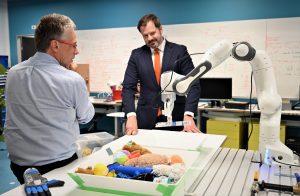
Distinguished Visitors & Exchange Opportunities
The Centre hosted 43 international visitors from 35 organisations and 15 countries in 2019.
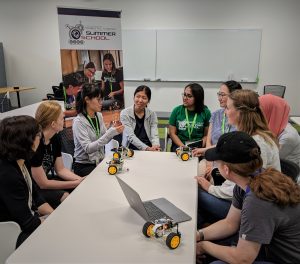
They included Professor Arto Visala (Aalto University, Sweden); Professor Fabio Faria (Federal University of Sao Paulo, Brazil); Professor Filipe Cordeiro (Federal Rural University of Pernambuco, Brazil); and Associate Professor Friedrich Fraundorfer (Graz University of Technology, Austria).
International speakers at our Robotic Vision Summer School (RVSS) included Partner Investigator Professor Seth Hutchinson (Georgia Tech, United States), Professor José Neira Parra (Universidad de Zaragoza, Spain), Professor Laura Leal-Taixé (Technical University Munich, Germany), Professor Tarek Hamel (University Côte d’Azur, France), and Professor Silvère Bonnabel (Mines Paris Tech, France).
Other centre-hosted international exchanges of PhD or Masters students included: Alexander Oliva (INRIA, France); Kentaro Wada (Imperial College London, England); Shray Bansal (Georgia Tech, United States); Paul Kaiser (KIT, Germany); Attila Lengyel (TU Delft, The Netherlands); Namhoon Lee and Harkirat Behl (Oxford, England); Vladimir Joulov (University of Waterloo, Canada) and Patrick Rosenberger (TU Wien, Austria).
The Centre also encourages our researchers to take advantage of opportunities to travel to other domestic and international laboratories and global technology giants to gain new insights and expertise in research approaches.
Centre researchers travelled to 70 international collaborators in 2019 including: Amazon (Las Vegas); Tokyo University; Harvard Medical School; NVidia (Santa Clara); Caterpillar Automation Centre (Pittsburgh); Google DeepMind; MathWorks; Softbank (Tokyo) and the Toyota Research Institute (California). Visits to Centre partner institutions included Oxford University, Imperial College London, Georgia Tech, and the University of Toronto.
Five Centre PhD researchers undertook internships during their PhDs, Sean McMahon spent three months based at Laing O’Rourke in Sydney, Australia; Rob Lee completed a six-month internship with Omron in Tokyo, Japan; Liu Liu spent 3 months in the Robotics and Autonomous Driving Lab, of Baidu, Inc, in Beijing, China; Jing Zhang spent 2 months at Hikvision United States; and Vladimir Nekrasov was an intern at Skydio in California, United States.
Workshops & competitions
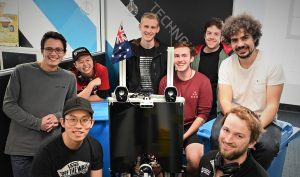
The Centre participated in the RoboCup@Home challenge held during RoboCup 2019 in Sydney. Our team entered “Rocky” a robot butler and mobile manipulator. Made with parts from around the lab, the challenge was around making a general-purpose robot butler. Tasks the robot could perform included taking out garbage and navigating to different areas around a “house” to collect it; and greeting people when they arrived, taking them to a seat, and introducing them to other people in the space. The team came sixth in the competition, and the challenge has spurred further research.
Our first Robotic Vision Challenge was launched and two workshops were run as part of this challenge. The Probabilistic Object Detection Challenge (PrOD) workshop was held during the Conference on Computer Vision and Pattern Recognition (CVPR), Long Beach, United States in June. This was a collaboration between Centre researchers in the Robotic Vision Evaluation and Benchmarking project team at QUT, Chief Investigator Gustavo Carneiro at the University of Adelaide, and long-standing partners from Google AI. A total of 18 international teams participated in the competition, and the four best teams presented their results during the workshop.
The project team organised a second workshop on the topic of ‘The Importance of Uncertainty in Deep Learning for Robotics’ at the International Conference on Intelligent Robots and Systems (IROS) held in Macau, China in November. In tutorial-style talks, they covered the state-of-the-art of uncertainty quantification in deep learning — specifically Bayesian and non-Bayesian approaches, spanning perception, world-modelling, decision making, and actions. Invited expert speakers discussed the importance of uncertainty in deep learning for robotic perception, and action.
Conferences
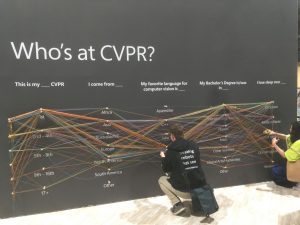
International conferences play a key role in growing our networks both at home and abroad. The Centre supports our researchers’ attendance at these events to share our findings, learn about important work other researchers are doing, and to recruit new researchers and students.
These activities lift our international reputation as a research centre. This helps us attract world-leading researchers to Australia, further enhancing our international linkages and collaborative partnerships.
Centre researchers participated in key conferences in 2019 including:
- Conference on Computer Vision and Pattern Recognition (CVPR) in Long Beach California, United States;
- International Joint Conference on Artificial Intelligence (IJCAI) in Macau, China;
- International Conference on Robotics and Automation (ICRA) in Montreal, Canada;
- IEEE Winter Conference on Applications of Computer Vision (WACV) in Hawaii, United States;
- Digital Image Computing: Techniques and Applications (DICTA) held in Perth, Australia;
- IEEE International Conference on Computer Vision (ICCV) held in Seoul, Korea;
- IEEE/RSJ International Conference on Intelligent Robots and Systems (IROS) in Macau, China;
- Australasian Conference on Robotics and Automation (ACRA) in Adelaide, Australia.